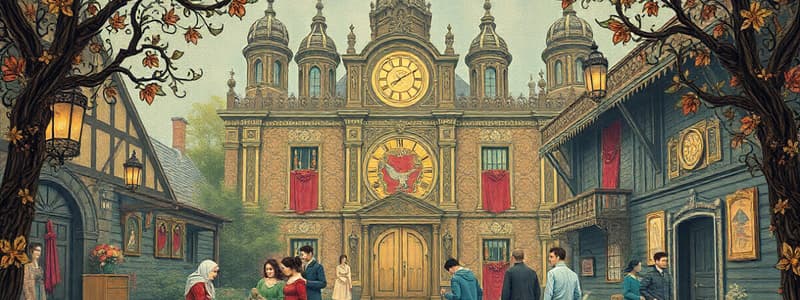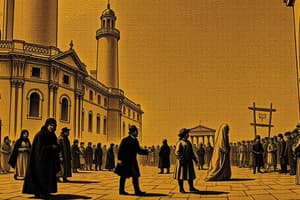Podcast
Questions and Answers
What is the primary focus of social science history?
What is the primary focus of social science history?
- The historical development of social sciences and their impact on society (correct)
- The development of natural sciences
- The evolution of technological advancements
- The origins of ancient civilizations
Which thinker is associated with the foundation of sociology in the 19th century?
Which thinker is associated with the foundation of sociology in the 19th century?
- Auguste Comte (correct)
- Jean-Jacques Rousseau
- Karl Marx
- Thomas Hobbes
What major theme characterized the Renaissance and Enlightenment periods?
What major theme characterized the Renaissance and Enlightenment periods?
- The influence of religion on governance
- Critiques of capitalism by various philosophers
- The establishment of feudal systems
- Revival of classical ideas emphasizing reason and individualism (correct)
What does the term 'intersectionality' refer to in contemporary social science?
What does the term 'intersectionality' refer to in contemporary social science?
Which of the following disciplines is NOT considered a key area of social science history?
Which of the following disciplines is NOT considered a key area of social science history?
How did the industrialization of the 19th century impact social structures?
How did the industrialization of the 19th century impact social structures?
What is a key function of social science research in relation to policy development?
What is a key function of social science research in relation to policy development?
Which of the following concepts relates to the increasing interconnectedness of societies?
Which of the following concepts relates to the increasing interconnectedness of societies?
Flashcards are hidden until you start studying
Study Notes
Overview of Social Science History
- Definition: Social science history examines the historical development of social sciences and their impact on society.
- Key Disciplines: Anthropology, sociology, political science, economics, and psychology.
Major Historical Developments
-
Ancient Civilizations:
- Early forms of social organization and governance in Egypt, Greece, and Rome.
- Philosophers like Plato and Aristotle contributed ideas on politics, ethics, and society.
-
Middle Ages:
- Influence of religion on social structures and governance.
- Development of feudal systems; emergence of early economic theories.
-
Renaissance and Enlightenment (15th - 18th centuries):
- Revival of classical ideas; emphasis on reason and individualism.
- Thinkers like Hobbes, Locke, Rousseau influenced political theory and social contracts.
-
19th Century:
- Rise of industrialization; shifts in class structures and urbanization.
- Foundation of sociology by Auguste Comte; development of social theories.
- Karl Marx's critique of capitalism; emphasis on class struggle.
-
20th Century:
- Growth of social sciences as formal disciplines in academia.
- Expansion of research methodologies, including qualitative and quantitative approaches.
- Development of behavioral sciences and their application in policy-making.
Key Concepts in Social Science History
- Social Structure: Patterns of relationships and social organization within society.
- Cultural Norms: Shared standards and values that guide behavior within a society.
- Power Dynamics: Relationships and struggles for power among individuals and groups.
- Globalization: The increasing interconnectedness of societies and cultures through trade, communication, and technology.
Influence of Social Sciences
- Policy Development: Social science research informs public policy and governance.
- Economic Planning: Understanding economic behaviors aids in designing economic systems.
- Social Movements: Analysis of social change and activism shapes contemporary movements for rights and justice.
Contemporary Issues
- Intersectionality: Examines overlapping social identities and their impact on experiences and privileges.
- Environmental Sociology: Studies the relationship between societies and their environments.
- Global Social Change: Impact of technology, migration, and globalization on social structures.
Notable Scholars
- Max Weber: Contributions to sociology, emphasizing verstehen and social action.
- Emile Durkheim: Focused on social integration and collective consciousness.
- Sigmund Freud: Pioneered psychoanalysis, influencing psychology and social theory.
Research Methodologies
- Qualitative Methods: Interviews, ethnography, and case studies to understand social phenomena.
- Quantitative Methods: Surveys and statistical analysis to assess social patterns and relationships.
Overview of Social Science History
- Social science history studies the evolution of social sciences and their societal impacts.
- Major disciplines include anthropology, sociology, political science, economics, and psychology.
Major Historical Developments
- Ancient Civilizations:
- Early governance models in Egypt, Greece, and Rome influenced social organization.
- Plato and Aristotle contributed foundational ideas on politics, ethics, and society.
- Middle Ages:
- Religion significantly shaped social structures and governance.
- Feudal systems emerged alongside early economic theories.
- Renaissance and Enlightenment (15th - 18th centuries):
- Revival of classical ideas emphasized reason and individualism.
- Thinkers like Hobbes, Locke, and Rousseau shaped political theory and social contracts.
- 19th Century:
- Industrialization caused class shifts and urbanization.
- Auguste Comte established sociology; social theories began to develop.
- Karl Marx critiqued capitalism, highlighting class struggle.
- 20th Century:
- Social sciences formalized as academic disciplines.
- Research methodologies expanded to include qualitative and quantitative approaches.
- Behavioral sciences emerged, influencing policy-making.
Key Concepts in Social Science History
- Social Structure: Describes patterns of relationships and hierarchies in society.
- Cultural Norms: Shared values and standards guiding societal behavior.
- Power Dynamics: Explores the relationships and conflicts over power among groups.
- Globalization: Highlights the interconnectedness of societies through trade, communication, and technology.
Influence of Social Sciences
- Policy Development: Findings from social science research guide public policy and governance.
- Economic Planning: Insights into economic behavior help design effective economic systems.
- Social Movements: Analyzing social change and activism supports contemporary rights and justice movements.
Contemporary Issues
- Intersectionality: Studies how overlapping social identities impact experiences and privileges.
- Environmental Sociology: Investigates the relationship between societies and their environments.
- Global Social Change: Examines how technology, migration, and globalization affect social structures.
Notable Scholars
- Max Weber: Noted for concepts like verstehen (understanding) and social action within sociology.
- Emile Durkheim: Focused on social integration and the notion of collective consciousness.
- Sigmund Freud: Introduced psychoanalysis, significantly impacting psychology and social theory.
Research Methodologies
- Qualitative Methods: Utilize interviews, ethnography, and case studies to investigate social phenomena.
- Quantitative Methods: Involve surveys and statistical analyses to uncover social patterns and relationships.
Studying That Suits You
Use AI to generate personalized quizzes and flashcards to suit your learning preferences.




